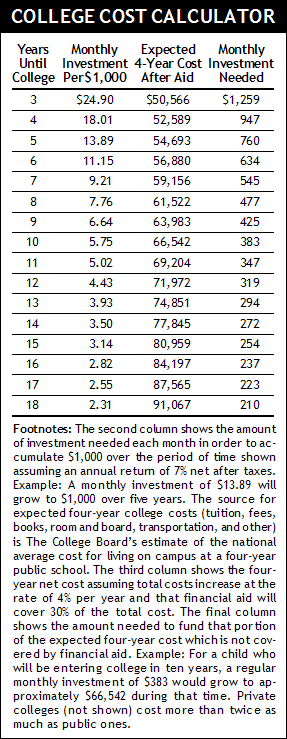|
|
|
Published since 1990, Sound Mind Investing is America's best-selling financial newsletter written from a biblical perspective. Visit the Sound Mind Investing Web site.
Request a free information packet regarding the Sound Mind Investing newsletter.
Investigate the widely-acclaimed Sound Mind Investing book, available at a 35 percent discount!
|
| |
|
PlanNing Ahead
The Smart College Savings Plan
CBN.com
– The college savings landscape has been altered numerous times over the past decade as each Congress puts its imprint on the issue of rapidly escalating college costs. Recent changes cementing the tax-free nature of Section 529 plans, while leaving the future status of Coverdell accounts dangling, have shifted it yet again. Here's our latest analysis of the college savings tides.
With college costs rising at more than twice the rate of inflation, students are increasingly taking on debt to finance their way through college. According to the American Association of State Colleges and Universities, two-thirds of college students now graduate with debt. For those students, the average amount of their debt load has more than doubled over the past ten years from $8,000 to $17,250.
Debt can be an overwhelming burden for young adults trying to make a successful transition from college to the "real world." But, with careful planning, your child doesn't have to incur huge debts to attend college. What follows are some practical tips on tackling what can easily be the single largest expense item of your life.
The first key is to get started now. You want to start early because the amount of time you have available to let the principle of compound interest work for you makes a huge difference in your eventual investment results.
The "College Cost Calculator" below dramatically illustrates the importance of getting an early start. For example, if you have 14 years before your youngster goes off to college, you only need to set aside $272 per month in order to build a college fund of $77,845. That $77,845 is expected to represent about 70% of the total bill for four years of college at a public school.
That's a reasonable goal, as the American Council on Education says that parents and students now combine to pay about two-thirds of college costs; student aid, either from the school itself or from taxpayers, pays the remaining third.
On the other hand, if you get off to a late start, your opportunity for compounding is diminished. If, for example, you have just six years remaining until college arrives for your youngster, you'll need to invest $634 every month in order to accumulate the roughly $56,880 you'll need for your 70% share.

The earlier you begin, the more risk you can take. This means selecting an aggressive portfolio that is initially 100% stocks, and adding short-term bonds or money markets as you get closer to the time when you'll need the money. The state-sponsored 529 plans we'll talk about later can automate this process for you.
The second key is to let your kids know that paying for college is their responsibility as well as yours. Spending for college is no different than any other purchasing decision. Just as some of us can't afford the most expensive house on the block, in the same way some of us can't afford to foot the bill for an expensive college education. Let your children know how much you will try to contribute toward college education. If they can find a school for that amount of money, that’s great. If not, it's up to their savings, summer jobs, scholarships, financial aid, and student loans to make up the difference.
To get them started thinking along these lines, it helps to start saving for college when they're young. Some families are able to begin when the child is born, either with previous savings or cash gifts received from grandparents. It doesn't have to be a large amount, but starting early makes a statement that this is an important expense that must be planned for far in advance. Over the years, the account can be added to with money received for birthdays, earnings from yard work, baby-sitting, and so on.
In part two, we’ll take an in-depth look at the pros and cons of each type of college savings vehicle. We’ll also determine which account is right for you based on your situation.
In our Sound Mind Investing newsletter, we try to regularly emphasize why we are here serving you in this way: We want to help you to have more so you can give more to share the good news of Christ's love with the world.
CBN IS HERE FOR YOU!
Are you seeking answers in life? Are you hurting?
Are you facing a difficult situation?
A caring friend will be there to pray with you in your time of need.
|